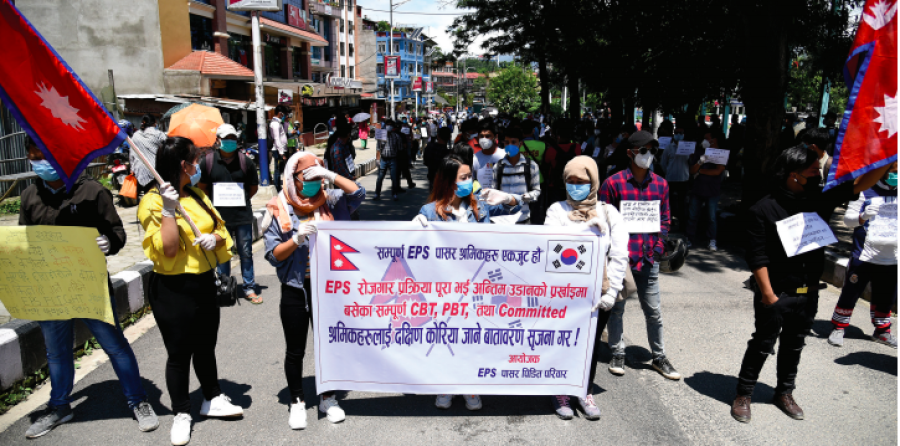National
Aspiring workers grow impatient as flights to Korea remain suspended
Years of hard work could go down the drain if the government doesn’t make arrangements for them to leave, they say.
Chandan Kumar Mandal
Laxman Poudel had been working in the Persian Gulf—first in Qatar and then in Dubai— since 2014. His income was satisfactory for both the jobs.
But his desire for change brought him back to Nepal to try his luck in South Korea, one of the most popular destinations for Nepali migrant workers.
“I would prepare for the Korean language test even in my free time when I was in the Gulf,” said Poudel, originally from Kawasoti, Nawalparasi. “I would watch videos on Youtube and prepare according to the syllabus from the official website.”
In 2019, Poudel, along with tens of thousands of other Nepalis, sat in for the Test of Proficiency in Korean (TOPIK), a mandatory Korean language test for those aspiring to work in South Korea. He cracked both the language and skill test and earned his berth for a Korean job.
“I had come to Nepal with a return ticket on vacation,” said Poudel. “I didn’t return to my job for my Korean dream, having imagined that everything would be much better in South Korea.”
However, the Covid-19 pandemic has come in between Poudel and his dreams as regular flights to the country from Nepal remain suspended for nearly four months.
Hundreds from a pool of a record number of applicants who appeared for the 2019 test, cleared the exam and went on to pass the skill test for recruitment in 2020. But they haven’t been allowed to head to work in the east Asian country.
Flights to South Korea, considered a relatively better destination for Nepali workers, have remained suspended since February after cases of Covid-19 exploded in the country.
A total of 6,773 individuals who cleared both the tests have been waiting to go to Korea. But these numbers are only for 2020; there are numerous others who passed the test in the preceding years and are waiting to go.
Nepalis waiting for their turn to get to South Korea are growing impatient. Last week, a group of workers, selected under the Employment Permit System (EPS), demonstrated in Kathmandu demanding that they be allowed to fly to Korea.
Dipak Neupane from Chitwan, who began chasing his Korean dream in 2018 while was a college student, passed his tests in 2019. “My friend told me that Korea is good in terms of money. So I started preparing for the language test,” said Neupane. “In 2019, I passed both the language and skill test for the manufacturing sector. I had thought that I would reach Korea soon and gave up my studies.”
But that did not happen.
“Nothing seems certain these days. When everything looked smooth, the Covid-19 pandemic hit us badly,” said Neupane. “But there is no point panicking because large groups of people are still waiting for their turn.”
Baburam Ghimire, spokesperson for the Employment Permit System, Korea Section under the Department of Foreign Employment, said around 2,500 applicants’ travel plans have been affected since the ban on international flights.
“Nearly 400 workers had their visa stamped. It may be valid only for around 15-20 more. They can go if the flights resume during this period,” said Ghimire. “Then, there are around 600 workers who have received their Certificate for Confirmation of Visa Issuance (CCVI). We have asked them for more documents to apply for the stamping of their visa.”
A migrant worker can stay up to four years and ten months in South Korea. Since 2008, more than 60,000 Nepali workers have reached South Korea following a government-to-government (G2G) deal.
But with the Covid-19 pandemic in both countries and the imposition of containment measures, Nepali workers could not leave for South Korea. Although Nepal had allowed those on their work breaks to return to Korea on a chartered flight, even they couldn’t do so.
After receiving their CCVIs, workers have six months to apply to get their visa stamped. Once they get the visa, they have to head to Korea within three months.
Around 1,000 workers would be ready to leave at the earliest after completing their paperwork, said Ghimire.
“Around 400 workers’ visas have already expired during the period of the lockdown,” said Ghimire
Before the pandemic, a group of Nepali workers left for South Korea every week. A handful of groups of Nepalis who cleared their tests for 2020 jobs had already flown to South Korea before the pandemic began.
Bhola Nath Guragain, spokesperson for the Department of Foreign Employment, said the department has been continuing to carry out day-to-day work for Korea-related jobs.
“But Nepali workers haven’t been able to fly to Korea because there are no flights,” said Guragain. “We have also written to the Korean authorities via the Ministry of Foreign Affairs to inform them about the current crisis in Nepal and why Nepali workers can’t go on time.”
Guragain said workers could be sent to Korea on regular commercial flights or special flights if the government makes such arrangements.
While there is no clarity on when the government will allow regular commercial flights to resume or make arrangements so that workers can leave for their Korean jobs, workers already fear they might lose their hard-earned opportunities.
“The pandemic has ruined everything for us. Everyone is panicking and knocking on every door possible,” said Poudel. “So far nothing has happened. There is growing fear that the jobs will be lost by the time regular flights resume.”




 14.12°C Kathmandu
14.12°C Kathmandu














